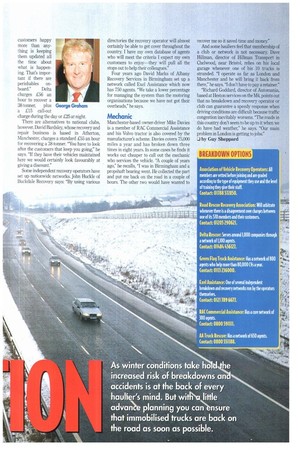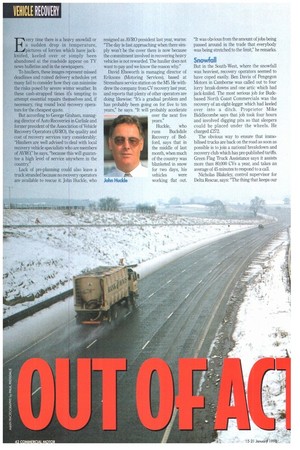As winter conditions take ho tithe increased risk of breakdowns an
Page 55

Page 54

If you've noticed an error in this article please click here to report it so we can fix it.
!accidents is at the back of every haulier's mind. But with\ajittle advarite planning you caAnsure that immobilised trucks are back on
the road as soon as possible.
Every time there is a heavy snowfall or a sudden drop in temperature, pictures of lorries which have jackknifed, keeled over or simply been abandoned at the roadside appear on TV news bulletins and in the newspapers.
To hauliers, these images represent missed deadlines and ruined delivery schedules yet many fail to consider how they can minimise the risks posed by severe winter weather. In these cash-strapped times it's tempting to attempt essential repairs themselves and, if necessary, ring round local recovery operators for the cheapest quote.
But according to George Graham, managing director of Auto Recoveries in Carlisle and former president of the Association of Vehicle Recovery Operators (AVRO), the quality and cost of recovery services vary considerably: "Hauliers are well advised to deal with local recovery vehicle specialists who are members of AVRO," he says, "because this will guarantee a high level of service anywhere in the country."
Lack of pre-planning could also leave a truck stranded because no recovery operators are available to rescue it. John Buckle, who resigned as AVRO president last year, warns: "The day is fast approaching when there simply won't be the cover there is now because the commitment involved in recovering heavy vehicles is not rewarded. The haulier does not want to pay and we know the reason why."
David Ebsworth is managing director of Eriksons (Motoring Services), based at Strensham service station on the M5. He withdrew the company from CV recovery last year, and reports that plenty of other operators are doing likewise: "les a gradual problem and has probably been going on for five to ten years," he says. "It will probably accelerate over the next five years."
Buckle, who runs Buckdale Recovery of Bedford, says that in the middle of last month, when much of the country was blanketed in snow for two days, his vehicles were
John Huck!e working flat out.
"It was obvious from the amount of jobs being passed around in the trade that everybody was being stretched to the limit," he remarks.
Snowfall
But in the South-West, where the snowfall was heaviest, recovery operators seemed to have coped easily. Ben Davis of Pengegon Motors in Camborne was called out to four lorry break-downs and one artic which had jack-knifed. The most serious job for Budebased North Coast Commercials was the recovery of an eight-legger which had keeled over into a ditch. Proprietor Mike Biddlecornbe says that job took four hours and involved digging pits so that sleepers could be placed under the wheels. He charged £272.
The obvious way to ensure that immobilised trucks are back on the road as soon as possible is to join a national breakdown and recovery club which has pre-published tariffs, Green Flag Truck Assistance says it assists more than 80,000 CVs a year, and takes an average of 45 minutes to respond to a call.
Nicholas Blakeley, control supervisor for Delta Rescue, says: "The thing that keeps our customers happy more than anything is keeping them updated all the time about what is happening. That's important if there are perishables on George Graham board." Delta charges £56 an hour to recover a 38-tormer, plus a £15 call-out charge during the day or £25 at night.
There are alternatives to national clubs, however. David Bardsley, whose recovery and repair business is based in Atherton, Manchester, charges a standard £55 an hour for recovering a 38-tormer. "You have to look after the customers that keep you going," he says. "If they have their vehicles maintained here we would certainly look favourably at giving a discount."
Some independent recovery operators have set up nationwide networks. John Buckle of Buckdale Recovery says: "By using various directories the recovery operator will almost certainly be able to get cover throughout the country. I have my own database of agents who will meet the criteria I expect my own customers to enjoy—they will pull all the stops out to help their colleagues."
Four years ago David Marks of Albany Recovery Services in Birmingham set up a network called Exel Assistance which now has 750 agents. "We take a lower percentage for managing the system than the motoring organisations because we have not got their overheads," he says.
Mechanic
Manchester-based owner-driver Mike Davies is a member of RAC Commercial Assistance and his Volvo tractor is also covered by the manufacturer's scheme. Davies covers 75,000 miles a year and has broken down three times in eight years. In some cases he finds it works out cheaper to call out the mechanic who services the vehicle. "A couple of years ago," he recalls, "I was in Birmingham and a propshaft bearing went. He collected the part and put me back on the road in a couple of hours. The other two would have wanted to recover me so it saved time and money."
And some hauliers feel that membership of a club or network is not necessary. Dave Hilknan, director of Hillman Transport in Chelwood, near Bristol, relies on his local garage whenever one of his 10 trucks is stranded. "I operate as far as London and Manchester and he will bring it back from there," he says. "I don't have to pay a retainer."
"Richard Goddard, director of Automania, based at Heston services on the M4, points out that no breakdown and recovery operator or club can guarantee a speedy response when driving conditions are difficult because traffic congestion inevitably worsens. "The roads in this country don't seem to be up to it when we do have bad weather," he says. "Our main problem in London is getting to jobs."
J by Guy Sheppard
BREAKDOWN OPTIONS]
Association of Vehicle Recovery Operators: All members are vetted before joining and are graded according to the type of equipment they use and the level of training they give their staff.
Contact: 01188 512850.
Road Rescue Recovery Association: Will arbitrate whenever there is a disagreement over charges between one of its 510 members and their customers.
Contact: 01205 290621.
Delta Rescue: Serves around 1,000 companies through a network of 1,100 agents.
Contact: 01484 456121.
Green Flag Truck Assistance:Das a network o1800 agents who help more than 80,000 (Vs a year. Contact: 0113236000.
Exel Assistance: One of several independent breakdown and recovery networks run by the operators themselves.
Contact: 0121189 6611.
RA( Commercial Assistance: Hasa core network of 300 agents.
Contact: 0800 591111.
AA Truck Rescue: has a network of 650 agents. Contact: 0800 551188.
















































































































